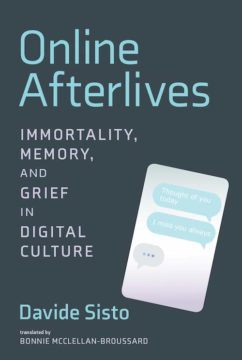 Houman Barekat in LA Review of Books:
Houman Barekat in LA Review of Books:
A FEW MONTHS AGO, I got a terrible fright. I was on my smartphone, rereading my old WhatsApp exchanges with a friend who had died in a car accident a year earlier, when suddenly the screen flickered and the friend came “online.” Presumably a relative had possession of the phone and was going through it; maybe they were looking to retrieve some specific piece of information, or perhaps they simply wanted to revisit their loved one’s online life — just as one might peruse a photo album or a trove of letters. There was a simple explanation, but I was nonetheless spooked: it was unnerving to see the account spring to life, because we tend to think of social media profiles as being inextricably entwined with their owner’s personhood — an extension, almost, of their physical selves.
What is the moral and legal status of a person’s digital avatar and its accumulated data? Is it merely property like any other, or does it occupy its own special category? In 2018, Germany’s Federal Court of Justice ruled that the parents of a 15-year-old girl who died after falling under a train had the right, under inheritance law, to access her Facebook account. The parents, who believed their daughter may have intended to kill herself, wanted to read her online correspondence to establish whether she was being bullied at the time of her death. This brought them into conflict with Facebook’s strict privacy policy, which permits only the most limited access for relatives of deceased users: they can either “memorialize” the profiles or delete them outright. Overturning the decision of an appeals court that had found in Facebook’s favor, the country’s highest court held that such digital data should be treated no differently than a person’s private diaries, passing to their legal heirs after death.
Intuitively this feels right, especially in the circumstances of that particular case. But merely having access to an account is one thing; using it to post new content in the name of the deceased person is another.
More here.
